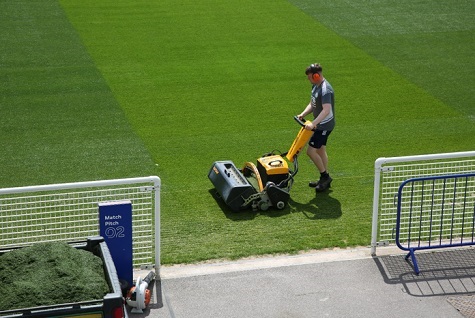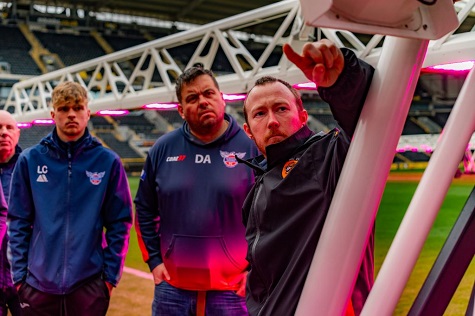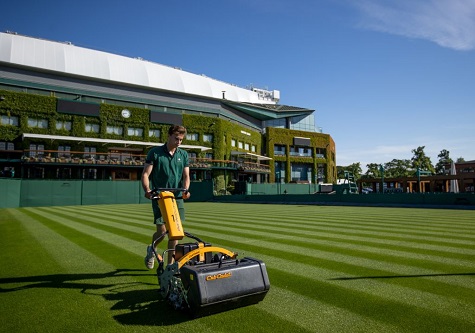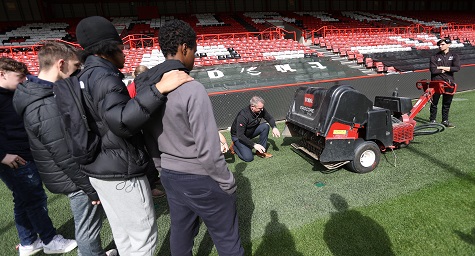
PICTURED ABOVE: Geoff Webb, GMA, CEO
Geoff Webb, CEO, Grounds Management Association (GMA) writes . . .
In his recent blog post, TurfPro editor, Laurence Gale rightly highlighted a couple of the key challenges facing the grounds management industry today:
He also asks what we, as an industry, can do as a whole to help address these issues together. Great question.
At the GMA, we’re working incredibly hard to tackle these challenges.
It’s no secret grounds management is an ageing sector. Our latest research shows that, in the sports turf sector alone, around 1,500 grounds professionals are looking to retire every year. Ensuring the next generation is there to support existing grounds teams, and take up the mantle when it’s time, continues to be a key focus for us.
Engaging younger people: the GMA’s NextGen
The GMA NextGen team is a group of passionate young professionals who are key to engaging the next generation. Formerly called the Young Board, the group is focused on attracting young talent to grounds management.

GMA NextGen has its own dedicated social media presence, reaching younger audiences directly. And the group will soon be launching the new national NextGen Network, opening a two-way conversation with young people across the UK who are already working in the sector or just beginning their journey. The aim is to create a peer-led, supportive environment where young professionals can share ideas and challenges to feel a stronger sense of community and belonging within the industry.
Our flagship Schools into Stadia initiative remains a cornerstone of our outreach. Our NextGen ambassadors take young people through their paces at some of the most iconic venues in the country, including Wimbledon, Lord’s and Anfield. These events are all about giving young people hands-on experience of grounds management, shifting preconceptions about the industry and inspiring more young people to get involved.
Crucially, GMA NextGen is making the industry more inclusive. Meg Lay and Liddy Ford are the first ever full-time female groundspeople at Lord’s Cricket Ground and Wembley Stadium respectively. And at just 27, Jack Langley is already Deputy Head Groundsperson at Ashton Gate Stadium. Attracting a more diverse demographic to the industry is essential if we want to make up the employment gap we’re facing.
Reesink is an official sponsor of GMA NextGen. We’re delighted to have a premium industry brand supporting the group’s mission and playing a role in inspiring the next generation of grounds staff.
In addition to GMA NextGen, we’re proud to play an active role in the industry-led Sports Turf Apprenticeship Trailblazer Group, helping shape new pathways into the profession. 17% of the current professional workforce came through apprenticeships, and we’re pushing to increase that number significantly in the years ahead.
Furthermore, we’re soon launching a hub on our website dedicated to people who want to get into the industry. This new resource will offer a clear, accessible entry point for anyone interested in grounds management, and will outline the practical steps needed to get started, while also mapping out long-term career progression options.
Creating clear career pathways and professional standards
Attracting talent is only half the battle, we’re also working really hard to make the industry the best it can be for those already in grounds management.
Our Grounds Management Framework (GMF) plays a huge part in this. For the first time, it gives our industry a structured, nationally recognised framework that clearly defines the skills and knowledge required at every level – from volunteer to senior professional. Whatever your role, you can see what’s needed to take your career to the next level. The framework also links directly to our high-quality training programmes – accredited by the Department for Education.

And we’re backing it up with even more action - our annual SALTEX exhibition, our expanding programme of GMA Connect regional events and our free digital resources all give people at every stage of their career the chance to learn from the best and grow their careers.
Working with National Governing Bodies (NGBs), including the Football Association, Rugby Football Union and England and Wales Cricket Board, we’re also helping secure greater support for ground staff. We’ve recently completed a four-year partnership with Premiership Rugby and cricket’s first-class county clubs to deliver specialised training and education to their grounds teams.
Celebrating rising stars
GMA NextGen boasts alumni who have gone on to become leading figures in grounds management, including:
Our Pioneer Legacy programme recognises their contributions to grounds management – celebrating the rising stars of the industry.
We’ve also recently launched 35 under 35 in partnership with ICL, a global leader in turf and landscape solutions. The initiative recognises young professionals and volunteers who are making a real difference in the grounds management industry. It’s all about ensuring the future of our profession is seen, heard and feels valued.
Raising the profile of groundspeople
I think the lack of awareness of our vital industry remains one of the biggest challenges when it comes to recruitment, and it's something we all need to address head-on.

A high priority of the GMA is to shift public perception of what it means, and what it takes, to work in grounds management. Too often, the reality of the role simply isn’t understood outside of the sector.
Earlier this year we teamed up with Twickenham Stadium, the home of England rugby, to secure two national features (one in The Times and another in The Telegraph). The articles showcase the vital role of grounds teams – as well as their skill and knowledge. Last year, we worked with Edgbaston Stadium Head of Sports Turf Gary Barwell to talk grounds management on the BBC’s hugely popular Tailenders cricket podcast.
One of our most high-profile milestones came in March last year when, for the first time in football history, an all-female grounds team prepared the pitch at Emirates Stadium for the Barclays Women’s Super League fixture between Arsenal and Tottenham. With a sell-out crowd of over 60,000, it became the highest-attended women’s domestic football match ever held in the UK – and the most-watched sporting event in London that weekend, surpassing even Premier League fixtures. It showed the critical role our profession plays in making elite sport possible. Planning is already under way for another similar event – this time at the Women’s Rugby World Cup in September at the Allianz Stadium.
It’s not just high profile groundspeople and venues that can help shine a light. We can all play our part in talking up and raising the profile of our industry – from journalists and employers to volunteers and professionals across the UK.
#GroundsWeek, our annual awareness campaign, is integral in raising the visibility of grounds management. Now a fixture on the industry’s calendar, it’s become a vital moment to celebrate the profession and showcase it to new audiences – and the more people inside the industry that support the campaign, the further the message goes.
Green shoots
There’s no quick fix when it comes to addressing the issue of recruitment and there’s lots more to do – but we’re seeing positive signs.

Our most recent research shows that in the professional sector, the number of people under 35 is rising steadily, up from 19% in 2022 to 31% in 2024. The number of female volunteers within the industry is now at 8%, up from just 2% in 2019. Similarly, representation of ethnic minority groups has risen to 5.4%, compared to 0.9% five years ago.
And when it comes to pulling together as an industry? We’re seeing this happen more. In addition to actively working with national governing bodies, we also collaborate with other professional bodies, training providers and employers to help grow awareness of our industry and address the key issues together.